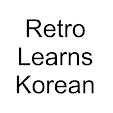What seems to be an overlooked aspect by many language learners, whether they are using classroom methods or immersion methods, here I want to share some books where one can increase their understanding of the language very quickly with very little effort. At the end I will also share some apps that can help beyond the books shown.
You may have heard about study methods such as reading through a frequency list. The main problem with this advice is that frequency lists generally have no structure or example sentences. Some words also have multiple meanings which the frequency list does not usually separate. If you are interested in a frequency list then you can find one here on ko.wiktionary.org
As you can see if you check the link, it is merely a list of words with no meaning or examples. The advantage of using the books I will recommend in this post is that they all contain much more information about every word and you can quickly go through them. Also I have created Anki decks for them meaning that once you have read them you can use an SRS to remember the vocabulary long term.
Although the Anki decks are free to use, I highly recommend purchasing a copy of the books not just to help support the creators but to give yourself more information about the words included. A quick read through before starting the decks will give you more of an advantage to remembering the words.

